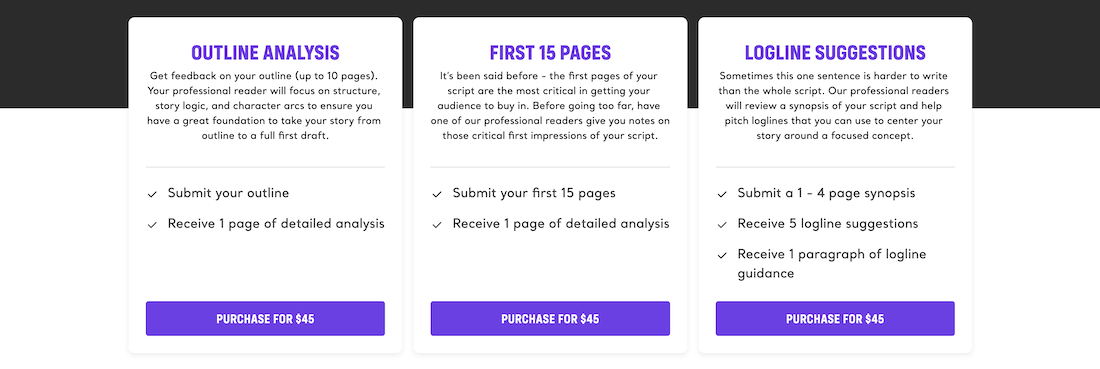What a Win Can Do for Your Screenwriting Career
Don’t listen to the online naysayers who criticize screenplay competitions. Yes, there are many out there looking for nothing more than a quick buck from you. But if you choose wisely and pick the right ones with connections to the Film/TV industry, you can reap the benefits.
While prize money is great, the real benefit to winning a screenwriting contest is the access you receive that you would likely not have achieved before.
The best contests, competitions, and fellowships (Nicholl Fellowship, Final Draft’s Big Break, The Launch Pad, ScreenCraft’s Genre Contests and Fellowship, etc.) offer outstanding access to Hollywood producers, development executives, managers, and agents—that is why you enter these marque competitions for.
The real awards have nothing to do with money. Instead, focus on the following:
- Calls/Meetings with producers
- Calls/Meetings with development executives
- Calls/Meetings with managers and agents
- Being included on lists sent to these industry insiders
A screenwriting competition win could lead to coveted representation, consideration for studio or network assignments, screenplay options, or outright acquisitions of your work.
How To Win a Screenwriting Contest, Competition, or Fellowship
1. Don’t Submit a Work in Progress
While it’s good to use contests to test the waters, if you’re trying to win, you need to make sure that you’re submitting your best possible efforts. Otherwise, what’s the point?
If you’re looking for a win, you want to:
- Submit scripts that have been reviewed by peers or script consultants, allowing you and your screenplay to get a second or third pair of eyes on it before you hand it over to others.
- If you’ve reached a level in your screenwriting where you can trust yourself and not have to rely on others, you need to make that story the best possible version of itself that you can before you enter it into any competition.
Every editing, structure, plot point, characterization, and dialogue decision needs to have already been made and applied. You’re not workshopping your script if you’re looking for a win. You want to hand them exactly what industry pro judges want to buy.
That’s the first step to winning a screenplay competition.
2. Submit a Vetted and Proofread Final Draft
Before you submit, you always want to vet and proofread the script as much as you can. Misspellings, poor grammar, missing words, and other basic mistakes can stick out like a sore thumb to script readers. Remember, readers are looking for any red flags to move on to the next. They are tasked with finding not just the best, but the best of the best. Don’t give them any reason to say no or move on.
And before anyone decries, “Wait, they would really dismiss my script because of some grammar issues?” That’s not the point. It’s all about presenting a professional front. That’s what they want to see. No, a couple of mistakes here and there aren’t going to disqualify you. But when you’re dealing with 90-120 pages, those mistakes add up. And they look unprofessional.
3. Be Genre-Heavy in Genre-Specific Contests
If you’re submitting to a specific genre contest, you want to make sure that your submission embraces that genre tenfold.
- If you’re submitting to a comedy contest, your script should be filled with scenes that generate laughs.
- If you’re submitting to an action contest, your script should have more than a couple of brief action sequences.
- If you’re submitting to a horror contest, that script better be full of scares.
Your script needs to play heavily in that genre’s sandbox, offering all of the expectations of the genre.
Most genre contests are judged by industry professionals who are heavily versed in that particular type of project. They likely live and breathe that genre—as does their company that may be considering your winning script for production. If you just have hints of the genre within the script, you’re not going to be able to compete with those that a genre-heavy.
4. Offer Something Familiar, But Different
Audiences love what is familiar to them. They know what they love and hate. And they use that knowledge to decide whether or not they’ll spend $100 or more to go to the theater with their family or friends. Because of this, studios love the familiar as well. Audiences dictate what studios make because they are the ones buying the tickets and handing over profits to the studios.
However, audiences get bored. That’s why trends come and go.
- Audiences crave something
- Studios deliver too much
- Audiences get bored with what they love
The trick is to offer Hollywood the familiar while offering them something new, original, and unique within.
Concept development is key. If you want to win competitions, you need to start from the development phase and conjure concepts that play in a genre sandbox, while throwing new toys into the mix. And those “different” elements can come from anywhere.
- Unique characters within a familiar genre or type of story
- Major plot twists
- Genre-blending
Find any way possible to offer Hollywood—and the audience—something familiar… with a twist.
Read More: The Power of Genre-Blending Screenplays
5. Subvert Expectations with Twists and Turns
The key to capturing the attention of any script reader or audience member is subverting expectations. Similar to what you’d do by giving them something different within an otherwise familiar concept or expectation, you can subvert expectations in any type of screenplay by going down a different path than what we normally see in conventional offerings.
And it’s not enough to do this once or twice in your script. Do it as much as you can in big and small fashion. If a contest reader or judge is continually surprised, your script becomes more and more memorable. That’s key because you want your script to be on top of every “recommend” list.
6. Open Well, Maintain in the Middle, Shock in the End
If there are three surefire ways to write a successful screenplay, this is what you need to do.
Open Well
You need to hook the script reader. Generally, most competitions generate anywhere from 800-1000 submissions on average. Some of the bigger contests have much, much more. There are only so many script readers they can hire to use as a filtration system to find the best scripts to forward to judges tasked with finding the best of the best.
The hard truth is that you likely have 5-10 pages to get a single reader invested in your story. Even if they are required to read the whole script regardless, they’ll start skimming if they are not truly engaged and enthralled.
Do your best to offer opening pages that engage, shock, or intrigue readers. If you think about it, that’s what the best movies do. So why wouldn’t you try to replicate that in your script?
Read More: How Do Screenwriters Hook the Studio Reader?
Maintain in the Middle
The second act (or the middle) of your script is the most difficult portion of your story. It’s fairly easy to come up with a great hook in the beginning. It’s also easy to deliver a great and memorable ending. But the largest chunk of your script is the second act—the middle.
If you can maintain the reader’s attention throughout the middle, you’ve engaged them well.
How do you do that? It’s actually pretty simple—continued and evolving conflict. With every few pages into the second act, you want to constantly be throwing more and more conflict at your characters. And that conflict has to grow with each bombardment of it. The stakes have the be raised continually.
Read More: How to Master the Middle of Your Screenplay
Shock in the End
Not every screenplay has to end like an M. Night Shyamalan film. But it sure would make a lasting impression if you had an amazing and surprising ending in your contest submission. If you’re in it to win it, you need to go the extra mile. And ending big is another memorable way to keep your script on the top of the list.
You can shock the reader in many ways and many genres. It’s the master subversion of expectations. And the ending to any script is so key because that’s what everyone will remember.
Again, if you want to win, you need to go big. And shocking the reader, in the end, is a great way to make a lasting impression.
Read More: 7 Ways to Master the Endings of Your Screenplays
7. Test Boundaries
The industry is seeing that time and time again, unique and original movies are succeeding at the box office and winning acclaim and awards. Look no further than the success of Everything Everywhere All at Once.
Put yourself in the shoes of a competition reader and judge:
- Readers are reading hundreds of scripts
- Judges are reading dozens
They read multiple scripts that may be good but are also overtly conventional.
Now, imagine what it would be like if you read a well-written, intriguing, and wholly original screenplay that tests the boundaries of conventional screenwriting.
No, the script can’t be weird and strange for the sake of being weird and strange. And, no, you don’t want to push the boundaries of script format too far because the format exists for a reason.
Read More: Does Screenplay Format Really Matter?
However, when you offer extra creativity and explore different ways to tell a story within the confines of the guidelines and expectations, you can push those boundaries and bend those rules.
That could very well give you the edge to win. Hollywood may not be ready for that particular script yet, but the win could get you the industry access you need to make them think otherwise.

—
There you have it. Seven ways to go the extra mile and increase the odds of you getting that coveted win. Let us know how it all works out!
Check out our Preparation Notes so you start your story off on the right track!
Ken Miyamoto has worked in the film industry for nearly two decades, most notably as a studio liaison for Sony Studios and then as a script reader and story analyst for Sony Pictures.
He has many studio meetings under his belt as a produced screenwriter, meeting with the likes of Sony, Dreamworks, Universal, Disney, and Warner Brothers, as well as many production and management companies. He has had a previous development deal with Lionsgate, as well as multiple writing assignments, including the produced miniseries BLACKOUT, starring Anne Heche, Sean Patrick Flanery, Billy Zane, James Brolin, Haylie Duff, Brian Bloom, Eric La Salle, and Bruce Boxleitner, the feature thriller HUNTER’S CREED, and many produced Lifetime thrillers. Follow Ken on Twitter @KenMovies and Instagram @KenMovies76.
The post How to Win a Screenwriting Contest, Competition, or Fellowship appeared first on ScreenCraft.
Go to Source
Author: Ken Miyamoto




